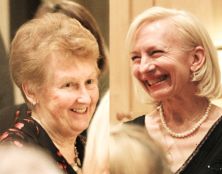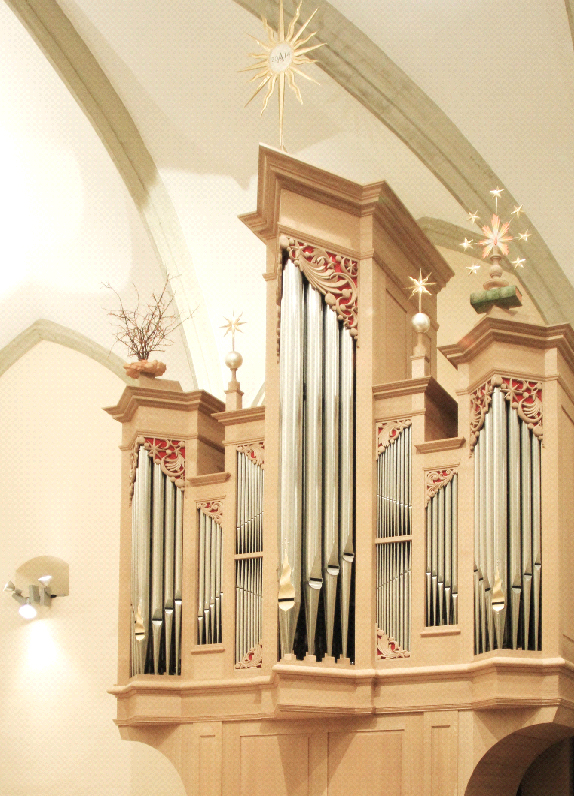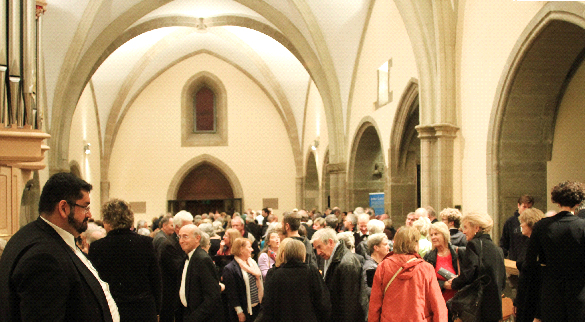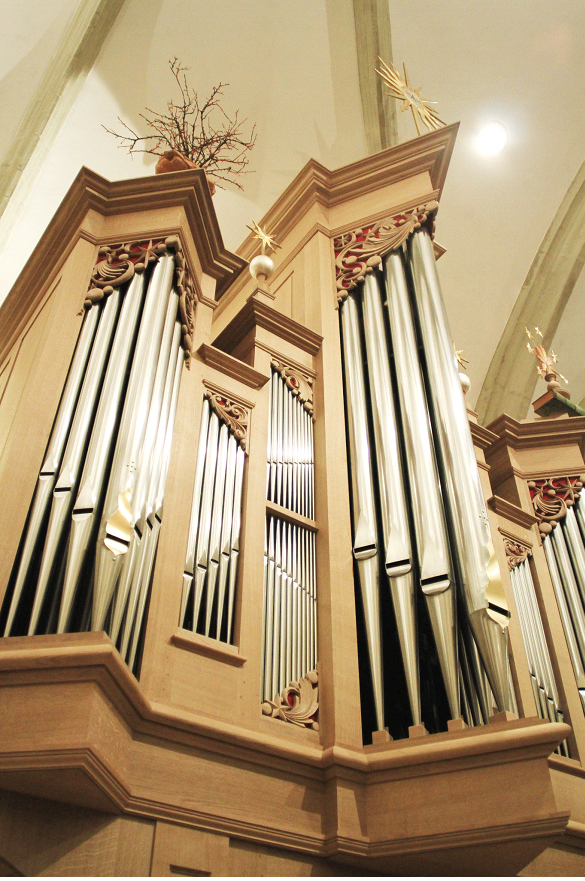
Lack of an Octave - Fulfillment of a Dream, AOA Concerts organizers interview by Nayoung Kim Millius, April 2023
Linda and Rebecca, organists and founding members of « Amis de l’orgue Auditoire Calvin » (AOA) talk about the history of the organ festival “Souffle de Printemps” and offer a few thoughts about organ music today. Interviews by Nayoung Kim Millius.
 .
.
Linda Revkin studied piano and organ at an early age and was naturally oriented towards a career in music. She received a B.A. and an M.A. from Boston University’s School of Fine and Applied Arts and later earned a PhD in Music Education from Northwestern University School of Music. As the organ was her major instrument during her university education, she continued to pursue her career as a church organist while teaching either in public schools and at universities.
“The organ has always been a fascinating instrument for me, whether it was a single manual tracker action organ, a four manual pneumatic action instrument or a new “pipeless” electronic instrument. It was always a challenge to explore each instrument and to arrive at the best sound possible.”
 .
.
Rebecca MacDonald started studying the piano at the age of 6 in the United States and has continued in Geneva with Joanna Brzezinska. As of age 14, she concentrated on the organ and studied with William Porter at the Yale University School of Music, Connecticut, USA. She has worked as an organist in the US, in Thailand, and in Switzerland, and performs in many organ concerts each year in Geneva. As she is very much in demand to accompany singers, she often accompanies on the piano/organ for singers’ recitals and choral concerts in Switzerland and France, and has also accompanied for musicals and operas in the Geneva region. She is resident organist at the Church of Scotland in Geneva, and also a regular organist at the Church of Christ, Scientist, in Geneva.In addition to obtaining a B.A. from Yale University, and a Master’s from the Open University, she pursued university studies in the Soviet Union, the United Kingdom and Geneva (translator’s diploma from the Ecole deTraduction et d’Interprétation Genève, and interpreter’s diploma from the Polytechnic of Central London), becoming a professional conference interpreter from Russian, French and Spanish into English for the United Nations, working all over the world.
Tell us about the origin of the association.
Linda : In 1974 when I arrived in Geneva I began directing the Church of Scotland choir and playing the organ in the Auditoire. I was completely baffled to find that the upper keyboard, or the Swell (Positiv) lacked the lower octave. Never in my long experience with organs had I encountered such an instrument. To say the least, this organ was severely limited, not only because of the lack of an octave but its relatively few stops. Later I learned that the organ was bought second hand and transferred from another church to the Auditoire.
Wouldn’t it be lovely to have an instrument specially conceived for the Auditoire? Was a thought shared by Rebecca
Together with some other members of the Church of Scotland congregation, we began tthe search for an organ builder.
After considering various proposals, we chose the internatiionally known french organ builder, Bernard Aubertin. He conceived and installed the magnificent instrument that now graces the Auditoire. One should also mention that the city of Geneva decided to renovate the Auditoire before the new organ arrived in 2014. Thus,the interior was repainted, stained glass windows were added as well as new chairs for the congregation, enhancing the building considerably.
Rebecca : So in 2014, when the work was done, Linda and I thought it should be definitely showcased for music-lovers in Geneva. In addition to doing demonstrations of the organ for the Fête de la Musique in Geneva, we organized our own annual organ festival informally. In 2017, we decided to set up an association “Amis de l’orgue Auditoire de Calvin » (AOA), so as to be able to request grants for the festival and to create a website, etc.
 .
.
What is the specific focus of the AOA ?
Rebecca : Our mission is two-fold. Firstly for the new Aubertin organ to be more widely known, and secondly, to showcase excellent organists playing on it. We try to make our festival more diverse and attractive for the audience by offering programs with unconventional concepts. For example we once had organ and saxophone in a recital presenting West Side Story music inter alia. In another program we suggested a “request” program where the organist gave the audience a sample of various pieces and allowed the audience to vote for the pieces they wanted to hear.
Organization of the Festival « Souffle de Printemps »
Rebecca : The organ is a much misunderstood instrument, and it’s important to demonstrate to the general public that it can be used for light, modern and spectacular music as well as for religious, solemn occasions. The Aubertin organ has a fabulous sound with a variety of timbres, and the location of the organ at the front-right side of the church allows people to see the organist at work, which is more interesting than hearing a disembodied sound only.
What are the main difficulties when organizing the festival?
Linda : In short, our biggest difficulty was securing enough funds to pay the Artists.
Neither of us had had much experience in the process of submitting requests for subventions, a valuable support for most festivals.
Secondly, we were novices at advertising the concert series.
However, in 2017, we established an official organization, the AOA, created a new Web site, and formed an excellent committee. Rebecca : The biggest problem has been to publicize the festivals as we do not have a fan-base yet. We had started building up our small support group when COVID-19 hit, and we could not hold the festival properly for two years. Since 2022, we have now slowly begun attracting more and more people again.
Linda : Despite all these difficulties, we were happy to create contacts with renown local and international organists such as François Delor, Lionel Rogg and Vincent Thèvenaz.
The latter, who is also the titular organist at Cathédrale St. Pierre,
 .
.
Could you tell us about the criteria for selecting artists?
Rebecca : We have tried to select organists from the wider Geneva area who are well enough known to appeal to music-lovers in Geneva. They are of all ages, and we try to include at least one woman organist in each festival. They are encouraged to choose their own programmes freely, so as to present a varied impression of the Aubertin organ.
Does the AOA communicate and collaborate with other similar organizations?
Rebecca : Yes. We work in partnership with the Concerts de la Cathédrale in Geneva. We have also been interviewed by Léman Bleu for their local news broadcast, and journalists from the Tribune de Genève have published two articles about the Aubertin organ.
And with any public association not related to music?
Linda : Up to this point, no.
In your opinion, how do you find the situation of organ music and organists today in our society?
Rebecca : Luckily, many organ concerts are organized regularly in the Geneva area, so that people are exposed to organ concert music, but more often than not, those concerts are under-attended. Also, it is hard for professional organists to earn enough money from their concert performances to survive, and church services have been reduced, leading to a decline in church organists’ earnings.
Linda : I am impressed with the number of highly gifted young organists in and around Geneva today. Somehow the love of organ music is alive and well even though the congregations in local churches are in decline. There is a great interest in transcribing other types of music for the organ as well as showing different uses of the organ in secular society. One example is that of Vincent Thévenaz and others who promote a series of “Silent Movies” accompanied by the organ.
Difference between a performing organist and a church organist?
Linda : Many concert performers are church organists as well and regularly organize different concert series throughout the church year in their churches. They not only invite other artists to come, but also perform themselves. These organists have attained a high proficiency through years of study at prestigious institutions and now are teaching at a conservatory or school of music. Another aspect of their life is giving concerts, either in Europe or worldwide. But not all church organists fall into the above category. Many church organists are not full time musicians. They might have considerable talent for playing the organ but have no interest in concertizing.
 .
.
How can we communicate the passion for organ music, which very often includes sacred music, in our secularized society?
Rebecca : In our festival recitals, we always invite the organist to introduce his or her programme verbally, so as to make the music come alive for listeners. After the recitals, they also are encouraged to discuss their programmes with the audience members and we allow the general public to try playing the organ. At least one of the recitals in each festival is followed by drinks and snacks to enable performers to mingle with the audience and committee members.
What do you want to pass on to future generations ?
Rebecca : One of our goals has always been to interest young people in the organ, which inspired us to organize a special recital for children in one of our festivals. In the future, we would like to continue highlighting organ music played by local musicians, particularly by presenting unconventional programs combining organ with other instruments. We would like our festival-goers to understand that a well-built mechanical organ like ours can last for generations and be versatile enough to adapt to all tastes and requirements.
Linda : Personally, I feel that there should be more concerts focused on children and their parents. These concerts need to be fun and interactive and should always include young beginning organists.
Other types of organ concerts could be didactic in nature, where the public learns among other things :
How sound is produced on an organ (pipes and bellows).
Why the numerous pipes produce different sounds.
Why an organ is like a symphony orchestra.
Why, unlike a piano, the organ has more than one keyboard.
This type of musical program would enlighten the public’s understanding of this complex, but wondrous instrument.
In which direction would you like the festival “Souffle de Printemps” to continue ?
Linda : I think that it should continue to build on the strong foundation that we have established. But hopefully, by being subsidized more extensively we might invite organists from further afield than Europe. And secondly, I would like to see perhaps a “mini organ series” especially for children and their families as I mentioned above.